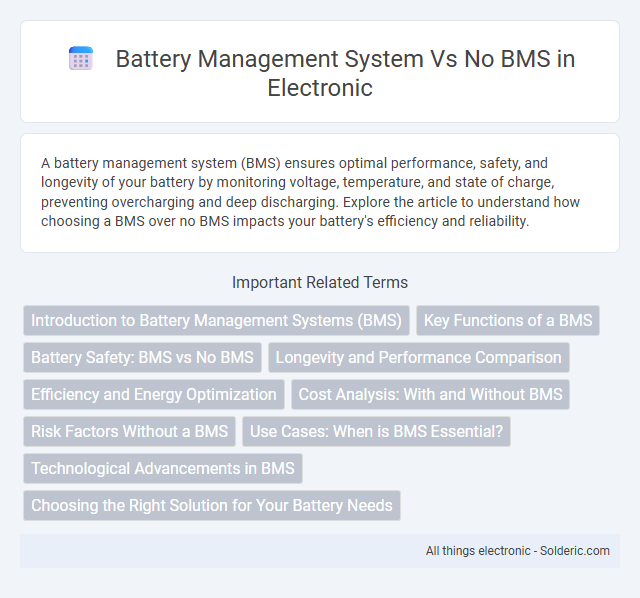A battery management system (BMS) ensures optimal performance, safety, and longevity of your battery by monitoring voltage, temperature, and state of charge, preventing overcharging and deep discharging. Explore the article to understand how choosing a BMS over no BMS impacts your battery's efficiency and reliability.
Comparison Table
| Feature | Battery Management System (BMS) | No BMS |
|---|---|---|
| Safety | Ensures protection against overcharge, overdischarge, short circuits, and overheating | High risk of damage, fire, or explosion due to lack of monitoring and protection |
| Battery Life | Optimizes lifespan by balancing cells and preventing harmful conditions | Reduced lifespan from uneven charging/discharging and stress on cells |
| Performance | Stable output voltage and current, improves efficiency and reliability | Inconsistent performance, voltage fluctuations, and potential failures |
| Monitoring | Real-time monitoring of voltage, current, temperature, and state-of-charge (SoC) | No monitoring capabilities; detection of issues only after failure |
| Cost | Higher initial cost due to added electronics | Lower upfront cost but potential higher expenses from battery damage and safety hazards |
| Application Suitability | Essential for lithium-ion and advanced batteries; critical in EVs, renewable energy systems | Occasional use in simple, disposable, or non-critical battery setups |
Introduction to Battery Management Systems (BMS)
Battery Management Systems (BMS) are critical for monitoring and protecting lithium-ion batteries by regulating voltage, temperature, and state of charge to ensure optimal performance and safety. Without a BMS, batteries risk overcharging, overheating, and capacity loss, which can lead to premature failure or hazardous situations. Your battery's efficiency and lifespan significantly improve with an integrated BMS that prevents damage and maintains balanced cell health.
Key Functions of a BMS
A Battery Management System (BMS) ensures optimal performance and safety by monitoring cell voltages, balancing charge levels, and protecting against overcharging, overheating, and deep discharge. Without a BMS, batteries risk uneven wear, reduced lifespan, and potential safety hazards due to lack of real-time diagnostics and protection mechanisms. Your battery's efficiency and longevity significantly improve with a BMS managing these critical functions.
Battery Safety: BMS vs No BMS
A Battery Management System (BMS) continuously monitors voltage, temperature, and current levels to prevent overcharging, overheating, and short circuits, significantly enhancing battery safety. Without a BMS, batteries are at higher risk of thermal runaway, capacity loss, and potential fire hazards due to uncontrolled charging and discharging cycles. Ensuring your battery pack includes a reliable BMS is crucial for maintaining safety and prolonging battery life.
Longevity and Performance Comparison
A Battery Management System (BMS) significantly enhances battery longevity by monitoring cell voltage, temperature, and current to prevent overcharging, deep discharging, and overheating, which degrade battery health. Batteries without a BMS often experience uneven cell aging, reduced capacity, and increased risk of failure, leading to shorter overall lifespan and inconsistent performance. Implementing a BMS optimizes energy efficiency and ensures balanced charge distribution, resulting in sustained peak performance throughout the battery's lifecycle.
Efficiency and Energy Optimization
A Battery Management System (BMS) significantly enhances efficiency and energy optimization by continuously monitoring cell voltage, temperature, and state of charge, preventing overcharging and deep discharging that degrade battery performance. Without a BMS, imbalanced cells and uncontrolled charging cycles reduce overall battery lifespan and energy utilization, resulting in frequent replacements and energy losses. Your battery's longevity and optimal energy use depend on the intelligent regulation and safeguards provided by a BMS.
Cost Analysis: With and Without BMS
A Battery Management System (BMS) adds upfront costs due to its complex electronics and software, but it significantly reduces long-term expenses by preventing battery damage, extending lifespan, and improving safety. Operating without a BMS may seem cheaper initially but leads to higher maintenance, early battery replacements, and potential safety hazards, resulting in greater overall costs. Your investment in a BMS ultimately ensures better cost efficiency and optimized battery performance.
Risk Factors Without a BMS
Operating a battery system without a Battery Management System (BMS) significantly increases risk factors such as overcharging, deep discharging, and thermal runaway, which can lead to battery damage or safety hazards. Without a BMS, you lack critical monitoring of voltage, current, and temperature, resulting in reduced battery lifespan and potential fire risks. Proper battery management ensures optimal performance and protects your investment by mitigating these hazards.
Use Cases: When is BMS Essential?
Battery Management Systems (BMS) are essential in electric vehicles, renewable energy storage, and lithium-ion battery applications where safety, efficiency, and battery lifespan are critical. Without a BMS, batteries risk overcharging, deep discharge, and thermal runaway, leading to reduced performance and potential hazards. Systems without a BMS are only suitable for simple, low-capacity battery setups with minimal safety and balancing requirements.
Technological Advancements in BMS
Battery Management Systems (BMS) have evolved significantly, integrating advanced algorithms, real-time monitoring, and predictive diagnostics that optimize battery performance, safety, and lifespan. Without a BMS, batteries risk damage from overcharging, deep discharging, and thermal runaway, leading to reduced efficiency and potential safety hazards. Innovations such as state-of-charge estimation, cell balancing, and communication protocols underscore the critical role of modern BMS technology in managing complex battery systems.
Choosing the Right Solution for Your Battery Needs
A Battery Management System (BMS) optimizes battery performance by monitoring voltage, temperature, and state of charge, preventing overcharging and extending battery lifespan. Without a BMS, batteries risk imbalance, overheating, and premature failure, compromising safety and efficiency. Selecting the right solution involves assessing battery type, application requirements, and desired longevity to ensure optimal power management and reliability.
Battery management system vs No BMS Infographic

 solderic.com
solderic.com